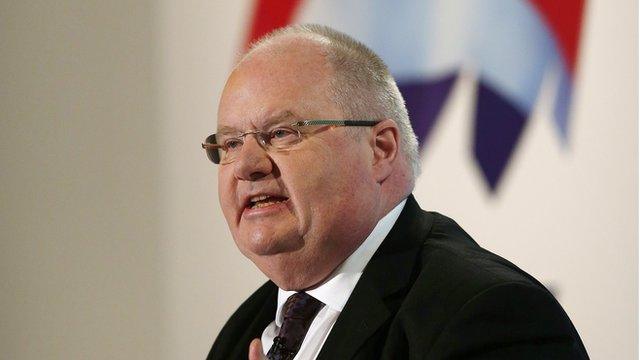Bulgaria ambassador hits out at UKIP poll 'propaganda'
- Published
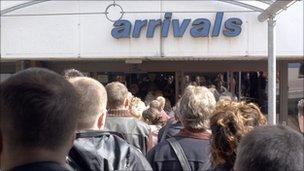
Restrictions on Romanians and Bulgarians coming to the UK will be lifted at the end of this year
Bulgarian officials have criticised campaign leaflets produced by the UK Independence Party as "hostile propaganda" in a row over immigration.
The country's ambassador said material sent to voters ahead of May's council elections, questioning the impact of Bulgarian migrants on UK jobs and social services, was "unacceptable".
Restrictions on what jobs Bulgaria and Romania migrants can do end in 2014.
UKIP said it was reflecting real public concerns about the issue.
Bulgaria and Romania joined the EU in 2007 but faced some controls on the kind of jobs their citizens could take in the UK and other member states.
The Conservatives, the Lib Dems and Labour have all been reconsidering their policies in light of this change and widespread criticism of the last government's failure to anticipate the large number of migrants from eastern Europe who came to the UK after EU enlargement in 2004.
The government was forced to deny reports earlier this year that it was considering launching an advertising campaign discouraging Bulgarian and Romanians from coming by focusing on the weather and the other downsides of living in the UK.
'Prevailing mood'
The Bulgarian Ambassador to the UK, Konstantin Dimitrov, suggested there was an "element of hostility in certain political quarters" over the issue.
And he singled out the UKIP - which has called for an end to "mass immigration" and argues that leaving the European Union is the best way for the UK to take control of its borders - for criticism.
"It is not the reflection of the prevailing mood of the British people towards the Bulgarian people but it is very disappointing and very discriminatory in certain aspects," he told the Murnaghan programme on Sky News.
"We react firmly, politely, but very strongly against these assertions and the atmosphere created by this propaganda."
He added: "There were, for instance, pre-election leaflets in counties that say the Bulgarians will be a threat to social system of the UK. This is absolutely unacceptable in a European country."
Mr Dimitrov said UKIP leader Nigel Farage was "usually very feeble in presenting solid arguments", suggesting he preferred to "engage in propaganda which deviates markedly from the essence of the debate".
In their leaflets, UKIP says that 29 million Bulgarian and Romanians will have the right to "live, work and draw benefits" in the UK and while many will be "fine, hard-working people", suggests the country may struggle to cope with "another influx" of "people needing jobs, housing schools, hospitals and benefits".
One leaflet suggests this will result in "fewer jobs available, pressure on hospitals, longer queues for care, wages going down, less money to go around and longer waiting lists for council housing".
'Gild the lily'
A UKIP spokesman said he would not apologise for drawing attention to the issue, saying the party "was speaking up for the interests of many people in this country who are not being given the correct information and who are picking up the tab".
The spokesman said UKIP was not blaming Bulgarian and Romanian people for wanting to come to the UK and suggested their governments must look at the economic and social conditions which were encouraging their citizens to look elsewhere to live and work.
"Frankly, it is not surprising that the ambassador is trying to gild the lily and dampen down concerns that are very real."
UKIP, which is fielding a record number of candidates in next month's elections on the back of strong performances in recent Westminster by-elections, said the issue was "definitely coming up" on doorsteps.
The spokesman also criticised the government for not releasing estimates of the number of likely arrivals from the two countries as this meant "the areas of the country which are likely to pick up the largest chunk of migration are unable to make a plan".
Communities Secretary Eric Pickles said recently "nobody really knows" how many Bulgarians and Romanians will come to the UK after 2013 while deputy prime minister Nick Clegg has said issuing "guesstimates" would not help public confidence in the immigration system.
The British Labour Force survey, produced by the Official for National Statistics, suggests there are currently 26,000 Bulgarians and 80,000 Romanians living in the UK but analysts say the actual numbers could be larger.
Voters go to the polls in elections to 27 county councils and 7 unitary authorities in England on 2 May.
- Published14 May 2014
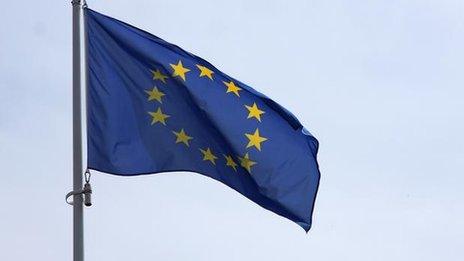
- Published5 April 2013
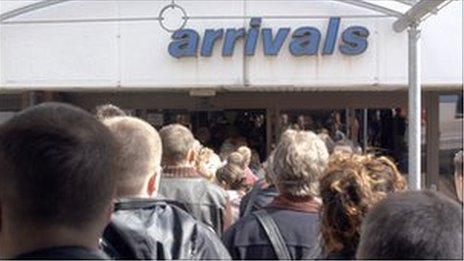
- Published25 March 2013
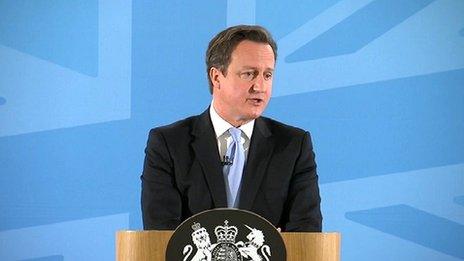
- Published19 March 2013
